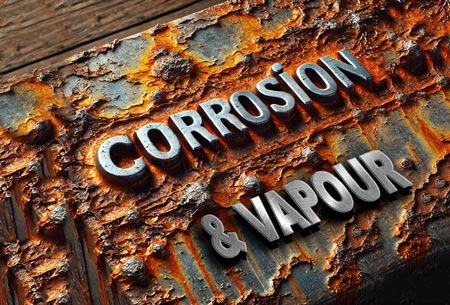 Corrosion
Corrosion
Corrosion and vapour permeability are interconnected in various engineering and industrial contexts. Vapour permeability plays a significant role in the corrosion process, as it determines how water vapour can penetrate materials or protective coatings, potentially leading to moisture accumulation and corrosion. Here’s a detailed look at how vapour permeability influences corrosion:
1. Mechanisms of Corrosion Involving Vapour Permeability
- Moisture Penetration and Electrolyte Formation: Vapour-permeable materials or coatings allow water vapour to pass through and condense on metal surfaces when temperature and humidity conditions change. The presence of condensed moisture creates an electrolyte, which is essential for electrochemical corrosion to occur. This moisture serves as a medium for ion transport, accelerating the corrosion process.
- Oxidation Reactions: When water vapour permeates through protective layers and reaches the metal surface, it can facilitate oxidation reactions. For example, in the presence of oxygen, water can react with iron to form iron oxide (rust), which weakens the metal over time.
2. Corrosion in Protective Coatings and Paints
- Blistering and Delamination: Vapour-permeable coatings can trap moisture between the coating and the substrate (the underlying metal), leading to the formation of blisters. This trapped moisture can cause the coating to lose adhesion, leading to delamination and exposing the metal to the environment, thus accelerating corrosion.
- Degradation of Coating Integrity: The permeability of a coating can determine its effectiveness as a barrier to moisture and other corrosive agents (like salts). High vapour permeability can allow the ingress of not only moisture but also corrosive ions (e.g., chloride ions), further promoting the corrosion of the underlying metal.
- Sacrificial Coatings: In some cases, coatings are designed to corrode preferentially to protect the underlying metal (e.g., zinc coatings on steel, known as galvanization). The rate of sacrificial coating degradation can be influenced by vapour permeability, as more moisture exposure may accelerate the sacrificial corrosion process.
3 . Corrosion in Metal and Concrete Structures
. Corrosion in Metal and Concrete Structures
- Corrosion of Reinforcing Steel (Rebar): In reinforced concrete, vapour permeability affects the movement of moisture and gases (like carbon dioxide) through the concrete matrix. If water vapour condenses within the concrete, it can lead to the corrosion of the reinforcing steel. This can cause the steel to expand as it corrodes, leading to cracking and spalling of the concrete.
- Chloride-Induced Corrosion: In coastal areas or regions where de-icing salts are used, chloride ions can penetrate vapour-permeable concrete. Once they reach the steel reinforcement, they disrupt the passive oxide layer on the steel surface, accelerating corrosion.
4. Environmental Factors Influencing Vapour Permeability and Corrosion
- Humidity and Temperature Variations: High humidity and temperature fluctuations can increase the amount of water vapour passing through permeable materials, leading to more frequent wet-dry cycles. These cycles can exacerbate corrosion, especially in environments where salts or pollutants are present.
- Industrial and Marine Environments: In environments with high levels of pollutants or salts (e.g., sulphur dioxide in industrial areas, salt spray in marine environments), the effects of vapour permeability on corrosion are more pronounced. Pollutants can dissolve in moisture, creating acidic or saline solutions that are highly corrosive to metals.
5. Materials Selection and Design Considerations
- Selection of Low-Permeability Materials: To prevent corrosion, materials with low vapour permeability are often used in protective coatings, sealants, and barriers. For example, epoxy or polyurethane coatings provide better protection against moisture penetration than more vapour-permeable coatings like acrylics.
- Use of Vapour Barriers: In construction and engineering applications, vapour barriers can be employed to prevent moisture ingress into sensitive areas, such as electrical components, pipelines, or metal structures.
- Corrosion-Resistant Alloys: In environments where vapour permeability cannot be entirely controlled, using corrosion-resistant materials like stainless steel or non-ferrous metals (e.g., aluminium, titanium) can mitigate the impact of moisture exposure.
6. Corrosion in HVAC Systems and Piping
- Condensation Inside Ductwork or Pipes: In HVAC systems, vapour permeability can lead to the accumulation of moisture inside ductwork, which, if made of metal, can corrode over time. Similarly, in piping systems, condensation can lead to internal corrosion, especially in systems carrying water, steam, or other fluids.
- External Corrosion of Insulated Pipes: Vapour permeability in insulation materials surrounding pipes can lead to "corrosion under insulation" (CUI). When moisture passes through permeable insulation and reaches the metal surface, it can cause significant corrosion that often goes unnoticed until severe damage occurs.
7. Protective Measures and Mitigation Strategies
- Applying Moisture-Resistant Coatings: Using coatings with low vapour permeability can provide a protective barrier against moisture ingress. For instance, multi-layer coatings or systems that include primers, sealers, and topcoats can improve resistance to vapour and corrosion.
- Regular Inspection and Maintenance: In environments prone to high vapour exposure, routine inspection and maintenance of coatings and protective measures are essential to detect and repair any damage that could lead to corrosion.
- Cathodic Protection: In some cases, cathodic protection systems can be used to prevent corrosion by making the protected metal the cathode of an electrochemical cell. This method is commonly used in pipelines, marine structures, and storage tanks.
Summary
Vapour permeability significantly influences the rate and severity of corrosion across various industries. By allowing moisture to reach susceptible materials, it accelerates electrochemical reactions that degrade metals and other substrates. Selecting appropriate materials, coatings, and design strategies to manage vapour permeability is critical in preventing corrosion-related failures and extending the service life of structures and equipment.
|
|


 Corrosion
Corrosion . Corrosion in Metal and Concrete Structures
. Corrosion in Metal and Concrete Structures